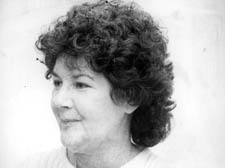|
|
 |
| |
An eclectic talent with unshakeable political beliefs
HELEN Lighthill, who has died aged 70, will be remembered for being an eclectic talent: her interests ranged from acting and singing to writing poetry and political activism. Her organisational abilities and political commitment made her an inspiration and well-respected member of a number of community groups and charities.
Helen was born in 1937 in Clerkenwell. Her mother, Pat, was a barmaid whose family were originally from Ireland. Her father was a cabbie: both were staunchly left wing and Pat worked for the Communist Party, organising the Clerkenwell branch.
It meant Helen was brought up in an environment of conflicting influences: she was sent to St Peters Roman Catholic school, and returned home at night to a house bubbling with socialist politics.
After leaving school she trained as an English teacher, but after her husband Frank’s death in the 1960s she had a break to look after her two young sons Toby and Dan.
Drama was never far away: Helen joined the Unity Theatre in the 1950s, and it was here she met her first husband, Frank Goldapple. In 1962, she became the first person in the UK to play Molly Bloom in a stage production of James Joyce’s Ulysses.
And her acting was just another facet of her love of performance. She became a much-admired folk singer, performing at Cecil Sharp House for the English Folk Dance and Song Society in Primrose Hill, and for the Unity Folk Club, a spin-off from the theatre group.
Her talent was used to underline her political commitment: she sang with great enthusiasm and gusto on demonstrations and picket lines, performing protest songs. And her dramatic skills were used well when she helped the campaign to stop the closure of the cinema in Parkway in the 1990s. She made film documentaries and won a prize for a film she produced about the cinema.
She also was behind the lens for a film about the Unity Theatre when it burnt down.
In the 1980s, when Helen had moved from Barnes to Camden Town, she retrained as a psychotherapist – a job which allowed her to use her interest in other people to good effect.
Helen gradually became disillusioned with party politics – she found her views at odds with the leadership of the Labour Party. However, rather than feel powerless, she took it on herself to make a difference as an individual.
This led her to becoming a key figure in Camden’s Age Concern. She worked as a trustee of the charity for five years and represented Age Concern Camden and the interests of older people on the Camden Community Police Consultative Group.
She is survived by two sons and a daughter, and eight grandchildren.
Dan Carrier |
 |
|
|
|
 |
|

